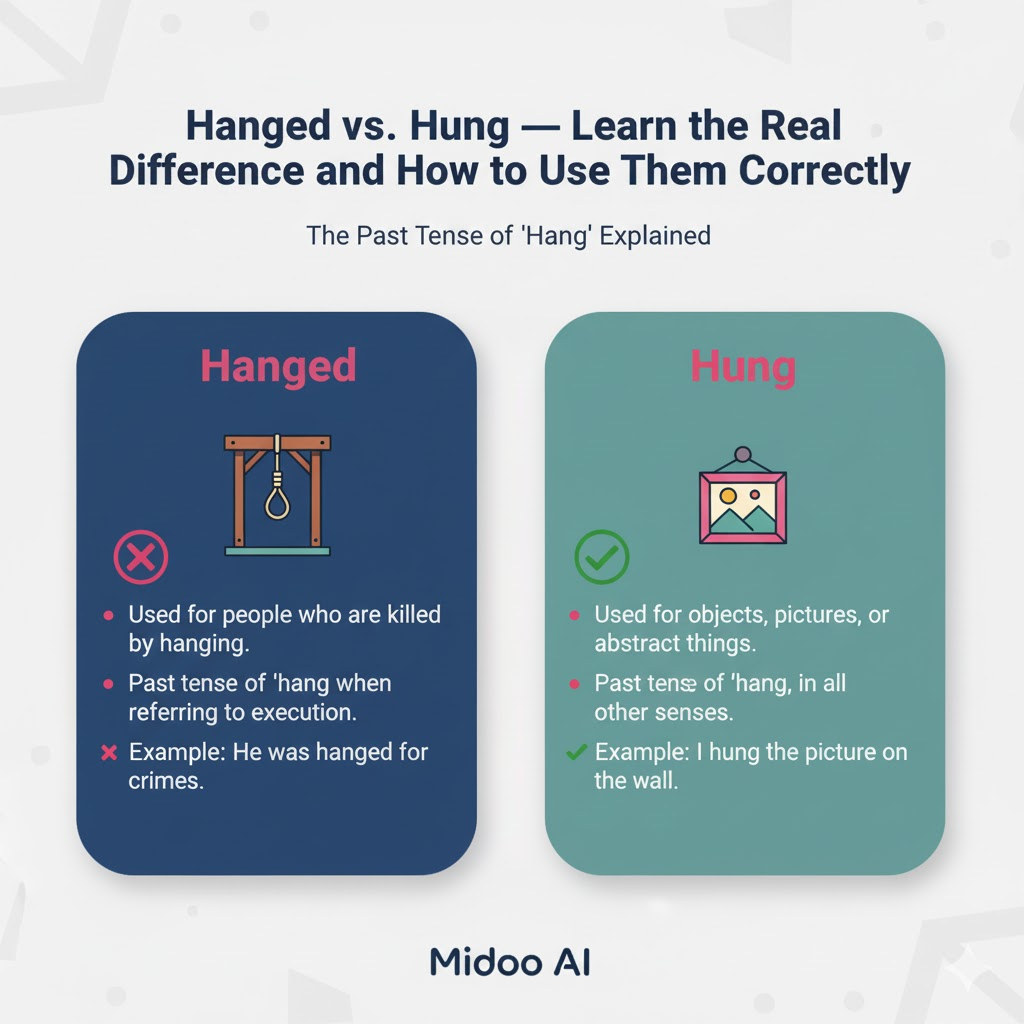Hanged vs. Hung—Learn the Real Difference and How to Use Them Correctly

If English ever feels tricky, you’re not alone—especially with words like “hanged” and “hung.” They both come from the same verb “to hang,” but their meanings aren’t always the same. Many learners use them interchangeably, but that can completely change your sentence’s tone or meaning.
At Midoo AI, we love breaking down confusing word pairs like this. Today, let’s explore the difference between hanged and hung, when to use each, and how to remember them easily.
1. The Core Difference
The simple rule is this:
- Hanged → used only when talking about execution (death by hanging).
- Hung → used for everything else (objects, pictures, coats, etc.).
So while both words come from “hang,” their uses are quite different today.
Examples:
- The prisoner was hanged for his crimes.
- She hung her jacket on the hook.
2. Why There Are Two Forms
Historically, hanged and hung were both acceptable as past tense forms of hang. Over time, English evolved and separated their meanings to avoid confusion.
“Hanged” became restricted to the legal or execution context, while “hung” became the standard for all other uses.
So, in modern English:
- You hang a picture → past: hung.
- Someone is hanged in execution → past: hanged.
3. Examples of Each Word in Context
When to Use “Hanged”
The criminal was hanged after the trial.
The movie showed a man being hanged in a dark alley.
In the 18th century, many pirates were hanged at sea.
The phrase “hanged by the neck” refers to execution.
The condemned prisoner was hanged at dawn.
Tip:
If your sentence involves death, crime, or execution, use hanged.
When to Use “Hung”
I hung my coat on the rack.
The painting was hung perfectly straight.
She hung fairy lights across her room.
The curtains were hung by the window.
He hung his head in shame.
Tip:
For all objects, feelings, or gestures, use hung.
4. Quick Comparison Table
| Context | Correct Form | Example |
|---|---|---|
| Execution / legal punishment | Hanged | The man was hanged for murder. |
| Picture / object / clothes | Hung | The photo was hung on the wall. |
| Emotional action | Hung | He hung his head sadly. |
| Idioms / phrases | Hung | She hung around after the show. |
🧠 Memory Hack:
“People are hanged. Things are hung.”
5. Common Mistakes to Avoid
| ❌ Incorrect | ✅ Correct |
|---|---|
| The criminal was hung for his crimes. | The criminal was hanged for his crimes. |
| He hanged the picture on the wall. | He hung the picture on the wall. |
| She hunged the curtains yesterday. | She hung the curtains yesterday. |
Tip:
Never add “-ed” to hung. “Hung” is already the past tense of hang in most uses.
6. Real-Life Usage Examples
- The artwork was beautifully hung in the gallery.
- The judge announced that the prisoner would be hanged.
- My grandmother hung wind chimes on the porch.
- During the old days, traitors were often hanged in public.
- The wet clothes were hung outside to dry.
Notice how the tone completely changes with the word “hanged.” It’s always serious or historical, while “hung” is used in normal, everyday situations.
7. Language Tip from Midoo AI
With Midoo AI, you can practice both words in context and get instant feedback. The app can tell whether your sentence fits a “legal” or “everyday” meaning and suggest the right form automatically.
For example:
You write: “The picture was hanged on the wall.”
Midoo AI suggests: “Did you mean hung? Use hung for objects.”
This kind of smart feedback helps you remember not just the rule—but the context behind it.
FAQ
Q1: Is “hung” ever correct when referring to people?
Yes, but only in non-execution contexts. For example, “He hung his head in shame” or “The kids hung out at the park.”
Q2: Was “hung” ever used for executions?
Historically, yes. In Old English, “hung” was used for both meanings. But modern English strictly uses “hanged” for execution to maintain clarity.
Q3: Is “hanged” used as an adjective?
Yes, in phrases like “a hanged man” (meaning someone who has been executed).
Q4: Can I use “hunged”?
No. “Hunged” is never correct. The past and past participle of hang (for objects) is hung.
Q5: Which is used more today—hanged or hung?
“Hung” is far more common because it’s used in everyday life. “Hanged” appears mostly in historical or legal contexts.